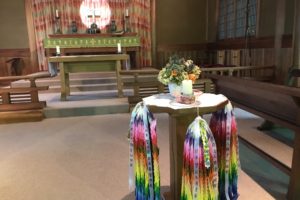November 5, 2023 23rd Sunday after Pentecost, Proper 26, Year A
Matthew 23:1-12
Rev. Misa Furumoto
Jesus said to the crowds and to his disciples, “Do whatever they teach you and follow it; but do not do as they do, for they do not practice what they teach.” Oh my gosh, these words hit home to me and probably also with many of us preachers. We try to convey the words of Jesus to you and explain to you what messages are now coming down from heaven through the words of the Scripture. But I know there are times when you can’t help saying to the preacher, “Look who’s talking!” It is really hard to carry out one’s words. I kind of feel sorry for the scribes and the Pharisees as following completely those laws of Moses is impossibly tough. Jesus must have known it, too, but why he was angry was that they were very strict to others while very kind to themselves. In Jesus’ words, “They tie up heavy burdens, hard to bear, and lay them on the shoulders of others; but they themselves are unwilling to lift a finger to move them.”
Come to think of it, this is totally opposite from how Jesus had been. Jesus was the one who bore people’s burden with them, as he said “Come to me, all you who are weary and burdened, and I will give you rest. Take my yoke upon you and learn from me, for I am gentle and humble in heart, and you will find rest for your souls. For my yoke is easy and my burden is light.” (Matthew 11:28-30). Jesus was never all talk and no action. He actually acted more than what he said.
Another important aspect is that the scribes and the Pharisees did not truly grasp the purpose of those laws. They believed that as long as they meticulously followed the laws, they would attain salvation. If you couldn’t adhere to them, tough luck, you would be labeled a sinner and deemed unsaved. It was seen as your own fault, plain and simple. There was no room for mercy. However, Jesus stood by the side of the weak and the marginalized. He befriended sinners and those who were isolated. Jesus comprehended the true essence of the laws: they were given to us so that we could understand God’s love, but we often failed to grasp it.
The scribes and the Pharisees desired to earn the respect of others due to their extensive knowledge of the laws. Consequently, they enlarged their phylacteries, the small leather boxes containing portions of the Torah that were worn on the forehead and arm during prayers, in strict adherence to Deuteronomy 6:8. Additionally, they lengthened their fringes, which were originally a part of the attire for all Israelites and later became known as the tassels attached to prayer shawls. They made these items larger and more conspicuous, hoping to convey their deep commitment to the Torah. They eagerly sought places of honor at banquets and the most prestigious seats in synagogues. They relished being greeted with respect in the marketplaces and being addressed as Rabbi or teacher by others.
How shallow they are! We now think. But we may be doing the same thing. We cannot deny the presence of “Pharisaic character” within us. We often demand from others what we cannot do ourselves, seeking love from others while lacking it within ourselves, obsessing over how others perceive us, and losing sight of the essential connections with our fellow human beings in the competitive race of life.
In the end, Jesus advises, “The greatest among you will be your servant. All who exalt themselves will be humbled, and those who humble themselves will be exalted.” However, the disciples of Jesus, as depicted in the Gospels, often exhibited behavior contrary to this teaching. They engaged in debates about who was the greatest and desired positions of prominence. How can we free ourselves from such attitudes?
Similar words can be found throughout the Gospels. Most of these passages are connected to Jesus’ passion and death. The disciples of Jesus were liberated from their competitiveness and jealousy after Jesus’ passion and death. When we are confronted with the image of Jesus humbling himself and serving, as seen in his passion, we too can find joy in living together as brothers and sisters in the presence of God, embracing equality as disciples before our teacher, Jesus.
In the name of the Father, of the Son, and the Holy Spirit, Amen.












